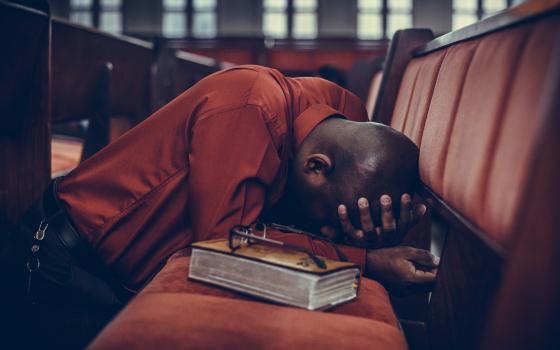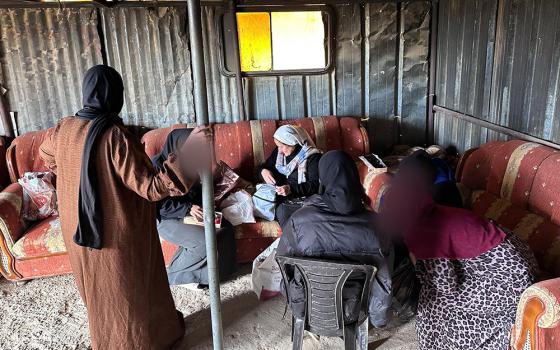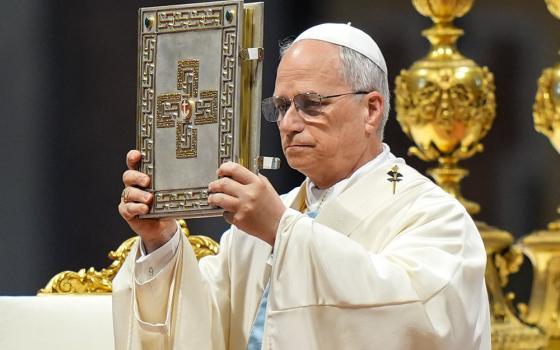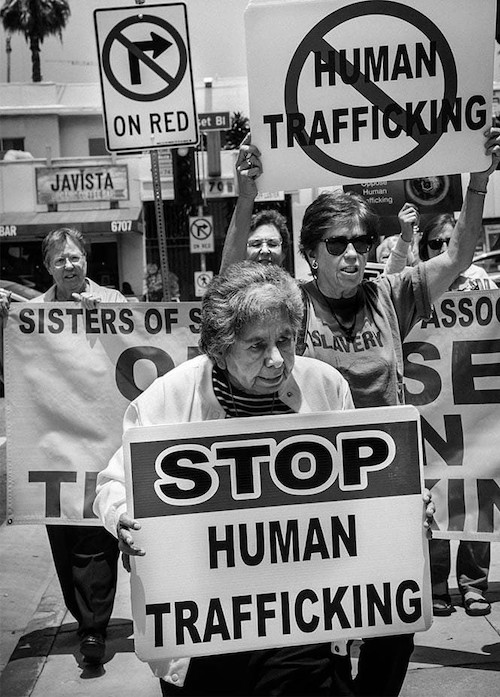
Catholic sisters from the Los Angeles area demonstrate against human trafficking in Hollywood, California. Front to back: Sr. Eleanor Ortega, Sr. Judy Molosky, Sr. Celia DuRea, Sr. Suzanne Jabro and Sr. Margaret Farrell. (Courtesy of Talitha Kum/Photo by Lisa Kristine)
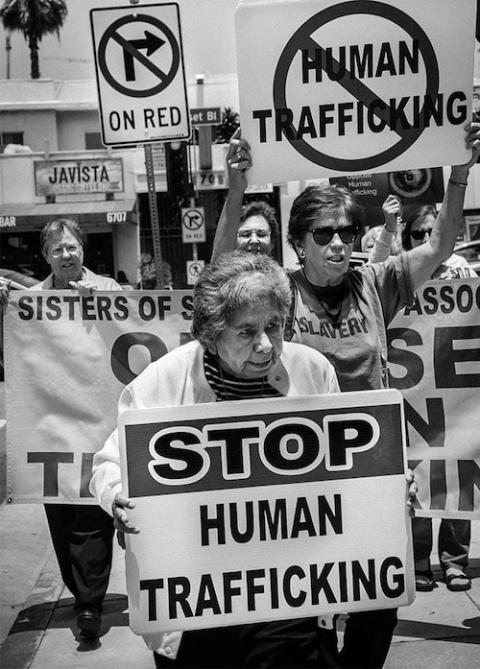
Catholic sisters from the Los Angeles area demonstrate against human trafficking in Hollywood, California. Front to back: Sr. Eleanor Ortega, Sr. Judy Molosky, Sr. Celia DuRea, Sr. Suzanne Jabro and Sr. Margaret Farrell. (Courtesy of Talitha Kum/Photo by Lisa Kristine)
Editor's note: To observe the United Nations' World Day Against Trafficking in Persons on July 30, we are publishing this excerpt of a longer essay by Sabrina Wong, program officer for the Conrad N. Hilton Foundation's Catholic Sisters Initiative. To read the full essay, go here. The Hilton Foundation is a major funder of Global Sisters Report. To learn more about the work Catholic sisters are doing to end human trafficking we direct you to GSR's anti-trafficking coverage.
Commentary - Human trafficking has many faces. Imagine a teenage girl pressured into prostitution by her boyfriend to pay the rent; a foreign national tricked into domestic servitude with promises of a better life; a fisherman trapped at sea working for wages that never materialize. These are just a few accounts of the estimated 40 million people who are enslaved across the world today.
July 30 marks the United Nations' World Day Against Trafficking in Persons, a time to raise awareness around human trafficking and amplify efforts to stop it. With the COVID-19 pandemic contributing to the re-traumatization of survivors and increasing risk among individuals experiencing disadvantage, the need is even greater to shine a light on the work Catholic sisters are doing to address the realities of human trafficking, both domestically and abroad.
Human trafficking is commonly defined as the exploitation of another human being for commercial sex or labor through the use of force, fraud or coercion. Broader characterizations include child soldiers, the sale of organs and forced marriage. Human trafficking is notoriously difficult to expose, and yet the International Labor Organization estimates that it is a $150 billion criminal enterprise — the third largest illegal activity in the world, behind drug trafficking and arms dealing. Traffickers may elude authorities by crossing international borders, or they may be part of domestic networks that crisscross regional lines.
Although many people are just beginning to recognize human trafficking as a critical human rights issue, Catholic sisters have championed the anti-trafficking movement since the first widely recognized case of human trafficking in the United States surfaced over 20 years ago. In 1995, over 70 Thai nationals were found enslaved in a makeshift garment factory in El Monte, California, shocking an array of human rights leaders, including sisters in the Los Angeles area. Sister-led ministries, such as the Good Shepherd Shelter and Alexandria House, as well as congregations, such as the Religious of the Sacred Heart of Mary, the Sisters of St. Joseph of Carondelet and Sisters of St. Joseph of Orange, all rallied around survivors. Nonprofits, such as the Coalition to Abolish Slavery and Trafficking (Cast),were founded to support anti-slavery efforts.
Today, Cast is a well-known anti-trafficking organization that has received accolades from the U.S. State Department and the United Nations. However, when Cast first began, Catholic sisters were among its only allies. While others didn't want to believe that slavery still exists or were afraid of getting involved, sisters immediately recognized the significance of this issue and provided trafficking survivors with long-term shelter in their houses and convents. As the anti-trafficking movement has grown, Catholic sisters have faithfully led the way. Sisters, who serve people without regard to religious beliefs, provided Cast with the first shelter in the U.S. exclusively dedicated to trafficking survivors, who have distinct needs due to the nature of the trauma they have experienced.
At an international level, Catholic sisters have also pioneered the prioritization of human trafficking as a top line issue. In 1998, the International Union of Superiors General (UISG), the worldwide leadership association of Catholic sisters, initiated a formal study of and collaborative effort against trafficking in persons. Two years later, the United Nations adopted its landmark Protocol to Prevent, Suppress and Punish Trafficking in Persons. Within six months of the U.N. resolution, the UISG officially made a commitment to address human trafficking "insistently and at every level" through working in solidarity with other congregations across the world. Catholic sisters have taken this mandate to heart. Today, UISG ministry Talitha Kum has an active membership of 2,600 sisters and their collaborators located in 92 countries, making it the largest anti-human trafficking network in the world.
Talitha Kum is translated from Aramaic as "Little girl, arise!" and is a reference to the biblical passage Mark 5:41, in which Jesus heals a young girl who is thought to be dead. The expression speaks to the possibility of transformation and wholeness even in the most extreme situations. The effectiveness of Talitha Kum has been recognized by the U.S. State Department, which publishes an annual Trafficking in Person (TIP) Report, the world's most comprehensive source of information on human trafficking. In 2019, the TIP Report recognized Comboni Missionary Sr. Gabriella Bottani as a TIP Hero for her role as the international coordinator for Talitha Kum.
Advertisement
Restoration of human dignity
Catholic sisters, also known as women religious, have unique qualities that make them especially apt foils for human traffickers. Trafficking intersects with the extreme and abusive drive for money, sex and power. Through vows of poverty, chastity and obedience, the lives Catholic sisters lead are a testimony to the futility of subjugating people to abuse in order to gain power and control. Thus, sisters possess a piercing moral authority and clarity that is underscored by their life-long commitment to the restoration of human dignity. Catholic sisters, who are grounded in years of prayer and personal reflection, are experts in exposing the lie that any human being is worthless or can be forgotten.
One of the most insidious aspects of human trafficking is the way traffickers break down the self-worth of victims to the point that force is oftentimes no longer necessary to keep them enslaved. Traffickers attack the human dignity of victims through abuse, unspeakable degradation, and threats both to the person and their loved ones. Catholic sisters are committed to lives of compassion and mercy, and are attuned to recognize people under duress. In fact, when sisters conduct awareness campaigns, it is not uncommon for them to be in conversation with young people who suddenly realize that they themselves are victims of human trafficking. Women religious instinctively see the wounds of others and, through acts of kindness and attentiveness, are able to awaken a sense of common humanity within survivors, who may be numb to their own reality.
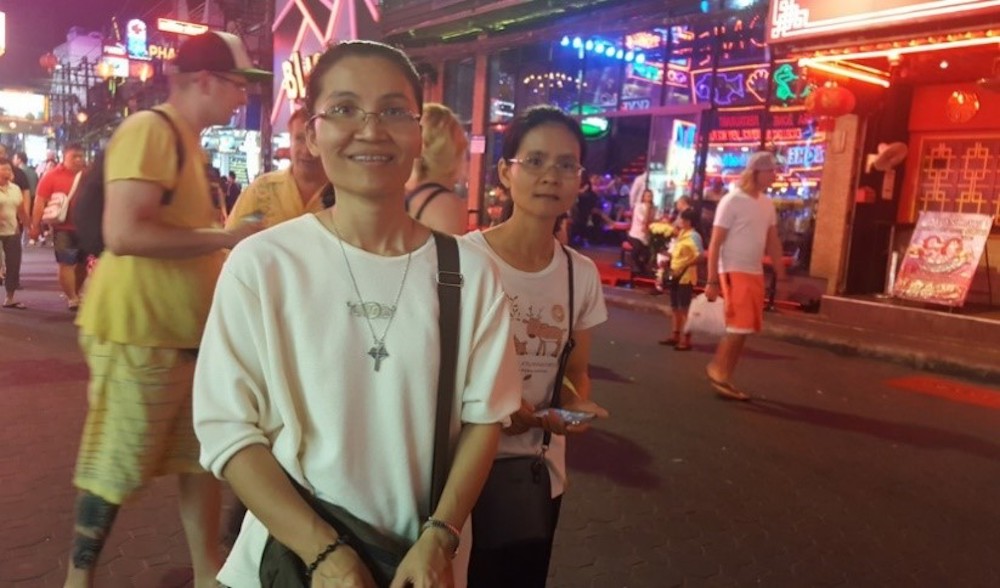
Sr. Piyachat Boonmul, left, and Sr. Apinya Sornjan conduct outreach in Pattaya, Thailand, in the bar district where the sex trade is prominent. (GSR file photo/Gail DeGeorge)
The root causes of human trafficking are complex: forced migration, domestic abuse, profits from commercial sex, armed conflict, and even climate change are all factors that contribute to human trafficking. However, the most common factor is poverty. This lack of basic necessities makes people vulnerable to predators who use psychological tricks to build false trust and hope. With their sacred vows of poverty, Catholic sisters can look people experiencing extreme disadvantage in the eye, rightly recognize them as equals, and walk with them side by side into wholeness. This act of accompaniment — physical, emotional and psychological support — contributes to a healing process that nurtures the resilience in survivors to deal with past trauma.
Although women religious work on behalf of victims of human trafficking regardless of gender identity, Catholic sisters stand in special solidarity with fellow women. The U.N.'s 2018 Global Report on Trafficking in Persons estimates that over 70% of all human trafficking victims are female. The low esteem that many cultures hold for women and girls contributes to their risk for being trafficked, often through the complicity of family members and people in the local community. With 700,000 women religious serving in over 200 countries, any statistical analysis would show that a percentage of Catholic sisters have had first-hand experience with the same discrimination and exploitation that affect women and girls worldwide. Sisters can identify with the pain of other women, and they possess a deep understanding to offer practical, compassionate support.
On the frontlines
In Pastoral Orientations to Human Trafficking, Pope Francis declares, "We are facing a global phenomenon that exceeds the competence of any one community or country," and therefore, "we need a mobilization comparable in size to that of the phenomenon itself." Pope Francis himself has recognized women religious as "Super Nuns" who are a mobilized network of global frontline actors. While sisters do provide first-rate direct services, they differ from international non-governmental organizations in their life-long commitments to the communities where they serve. Moreover, sisters work in remote villages and poverty-stricken areas that are especially prone to trafficking, and where large international NGOs do not often reach.
To show the scale of Catholic sisters' ministries, the Arise Foundation estimates that at least 900 women religious are working against exploitation in the state of Assam, India, a region known for its eponymous tea. Tea plantations require intense physical labor, and are often sites of forced child labor. In addition, poor living conditions in rural areas such as Assam make villagers prone to the deceit of human traffickers who promise better lives in the city. By sheer numbers, the 900 Catholic sisters in Assam alone match the workforce of the largest anti-slavery NGO in the world.
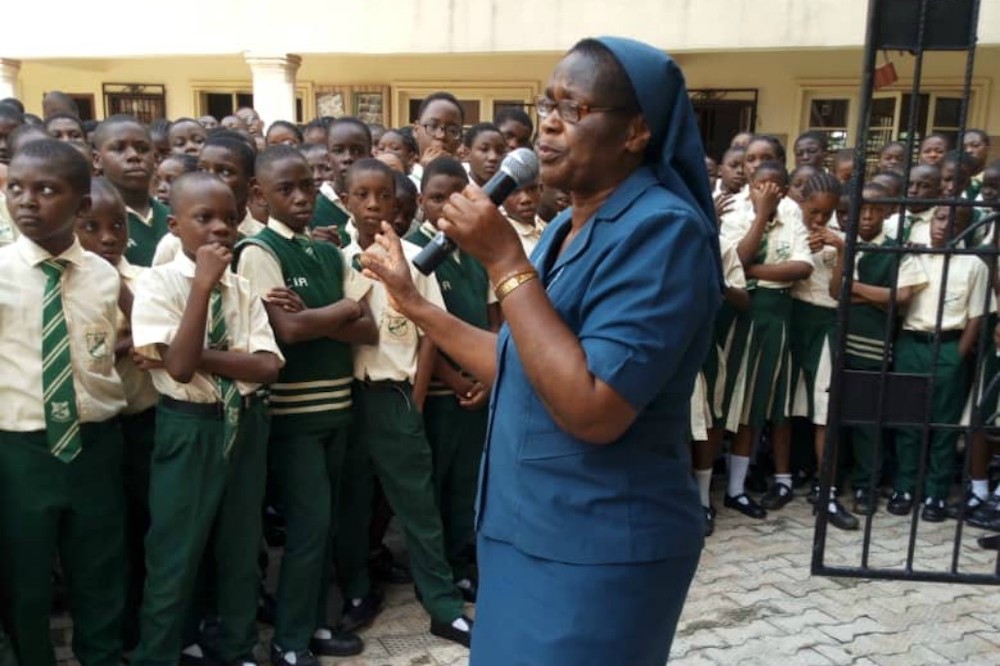
Sr. Bibiana Emenaha conducts a human trafficking awareness campaign at a rural school in Edo, Nigeria. (Courtesy of the Committee for the Support of Dignity of Woman)
The ministries of Catholic sisters typically include one or more components of the internationally recognized anti-trafficking framework of prevention, protection, prosecution and partnership. For example, in Nigeria, Talitha Kum member Committee for the Support of the Dignity of Woman (COSUDOW) is a partnership formed among more than 50 congregations of women religious. COSUDOW members unite to disrupt a familiar, heart-rending narrative: a young person in poverty seeking a better life encounters someone who seems trustworthy. Honest employment is offered in Europe or the Middle East, but the young person is instead trafficked for labor or sex.
To prevent this tragedy from gripping youth in their communities, Nigerian sisters conduct awareness campaigns in schools and churches, and provide job training so that young people can find livelihoods in their hometowns instead of seeking employment abroad. Nigerian sisters also offer hope and restoration for survivors who have been sent back home to Nigeria through psychological support and shelter. In addition, COSUDOW leaders have partnered with civil society in drafting and passing anti-trafficking legislation. This legislation provides the necessary framework for human traffickers to be prosecuted for their crimes.
Because poverty is the most prevalent risk factor for human trafficking, the ministries of many Catholic sisters intentionally include practical job skills as part of a holistic continuum of care for survivors. Southeast Asia is a known hub for sex tourism, where the boundaries between the sex trade and human trafficking are often blurred. In Pattaya, Thailand, Our Lady of the Good Shepherd Sisters run the Fountain of Life Women's Center, where young women who have been involved in commercial sex can learn skills such as hair dressing, jewelry-making and computer literacy. In Phnom Penh, Cambodia, Maryknoll sisters direct the Horizons Vocational Training Institute, where former commercial sex workers take part in a two-year residential program that employs a skills-based curriculum developed for the Association of South East Asian Nations (ASEAN). Participants take classes in basic math, science, reading and English, as well as classes in essential hotel operations, such as reception, catering and housekeeping.
In India, where the sex trade also thrives, Sisters Adorers manage the Nava Jyoti Dan center in the red-light district of Kolkata. At the center, young women learn skills like tailoring and making handicrafts. Likewise, Las Adoratrices Sisters provide sewing and cooking classes for sexually exploited women at the Kredita no ba center in Cape Verde, an island off the west coast of Africa that has been a historic stopping point for the slave trade into Europe. The faith of women religious has led them to envision these centers, dotted across the globe, in which former sex workers can "arise" to more fulfilling lives.
Young women at these centers learn job skills but, equally important, they also experience the unconditional love of Catholic sisters, who value them as people made in the image of God. At all of these centers, sisters provide counseling services that support the inner healing necessary to recover from years of trauma and degradation. Women religious have learned that self-acceptance and the ability to generate income work together in the restoration of the dignity and wholeness of women who have been trafficked for sex.
[Sabrina Wong is a program officer for the Conrad N. Hilton Foundation's Catholic Sisters Initiative. With a strong interest in intercultural work that values the dignity of the human person, she has worked in both the fair trade and anti-human trafficking movements. Previously, she served as vice president for a faith-based non-profit sending volunteer teachers to Africa, Asia and Europe. She has degrees from Stanford University and Fuller Theological Seminary.]





